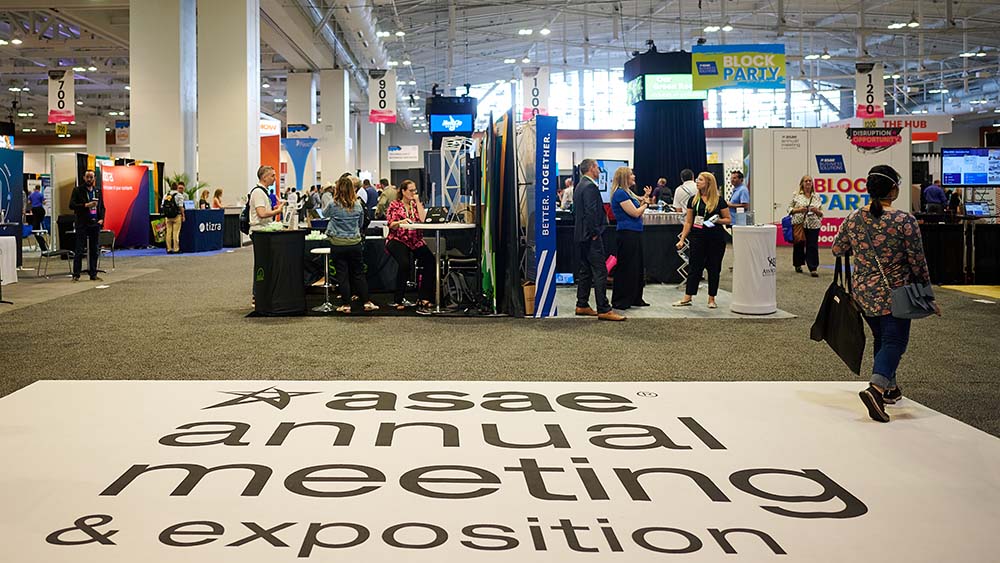
SocialOffset was trialized at ASAE’s 2022 Annual Meeting in Nashville, where participants volunteered to form a board to support the initiative. (Nick Hagen for ASAE)
In 2019, Elena Gerstmann, Ph.D., FASAE, CAE, found herself stuck at an airport where there were no options for food other than a Chick-fil-A. Between bites of her sandwich at the fast-food chain, Gerstmann, who now serves as executive director at INFORMS, an international association for professionals in analytics and operations research, wondered how much of what she had just spent on her meal could potentially be invested in organizations that work against her values. Chick-fil-A has a history of donating to anti-LGBTQ+ organizations.
She shared those thoughts with her wife, Beth Surmont, CMP, FASAE, CAE, vice president of event strategy and design for 360 Live Media, who several years later experienced similar misgivings when attending SXSW in Austin last March. It was taking place around the time that Texas Gov. Greg Abbott ordered state child welfare officials to launch child abuse investigations into reports of transgender kids receiving gender-affirming care. “I was conflicted about being there,” Surmont told Convene. She discussed with Gerstmann the possibility of making a donation to a cause supporting transgender rights to counter the impact of her spending in the state.
As they made plans to attend ASAE’s 2022 Annual Meeting in Nashville just a few months later, Gerstmann noticed that ASAE member Erin Fuller, FASAE, CAE, chief strategy officer, MCI USA, had started posting in an online community chat “that we should really do something while we’re there for abortion rights, because there was a trigger law going into effect” in Tennessee, she said.
Fuller’s post accelerated the couple’s thinking about how to enable people to donate to a local charity that aligned with their values as a way to offset their travel to an event in a state whose policies may be harmful to causes they care about. And the concept of SocialOffset was born. They “ran a really teeny tiny test case at ASAE’s annual meeting — it was all about minimum viable project,” Surmont said. “Let’s see if this works.”
The grassroots effort inviting attendees to donate to a local organization that supported reproductive rights “caught the attention of several people,” she said. Kiki L’Italien, CEO of Association Chat and Amplified Growth; Rhonda Payne, CEO and founder of Flock Theory; Marc Beebe, senior director of strategic research, public imperatives, and corporate development at IEEE; Christie Tarantino-Dean, FASAE, CAE, CEO, Institute of Food Technologists, and James Pogue, Ph.D., CEO of JP Enterprises, decided to form a board of directors with Fuller, Surmont, and Gerstmann, and donate their time to develop the nonprofit, which officially launched in early January. The International Society for Heart and Lung Transplantation was the first organization to officially test SocialOffset by enabling participants at its Leadership Retreat to donate to a vetted charity of their choice via socialoffset.org (See “How IHSLT Partnered With SocialOffset” story below).
Bypassing Boycotts
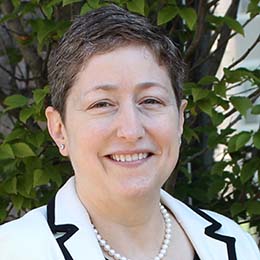
“I’ve had people share with me that they just want an option to do the right thing and they’ve been misinformed about the effectiveness of boycotts. This provides an option where everyone wins: the event, the destination, and most importantly, the local people we are trying to help.”
— Elena Gerstmann

“There are two kinds of boycotts going on right now. There [are] attendees who will boycott their association’s event. And then there are associations or event organizers who will boycott a destination.”
— Rhonda Payne
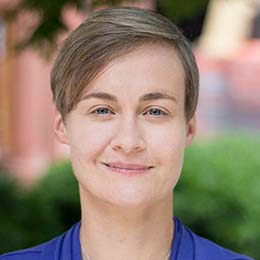
“It’s been a learning process for me. Many of us have been taught that boycotting is a good thing, right? But there is research from Destinations International that boycotting an event at a destination isn’t helping. It’s only hurting the frontline workers who rely on that event income.”
— Beth Surmont
L’Italien said that they are busy collecting examples of other events that have offered SocialOffset as an option for attendees. “A lot of organizations are nervous about the way to approach these things, and it’s very nuanced, depending on the industry, depending on the type of meeting that’s being held,” she said, “and the people who will attend.” Sharing how other groups have used SocialOffset can help allay organizations’ concerns and give them ideas for their own events, she added.
“We’ve identified our key focuses for this year: racial justice, reproductive freedom, LGBTQ+ equality, environmental sustainability, housing security, and hunger relief,” Surmont said. “The intention is that we will relook at those every year and adjust as needed. We work with organizers to understand which of the causes resonate with them and identify and vet the local charities.” Surmont said their No. 1 piece of vetting criteria is that it is a local organization. “This is really based on making local impact because that’s where the offset comes in,” she said. “So you’ll see Planned Parenthood on our website, but it’s the local chapters that are getting those donations as opposed to the national chapters.”
‘Bring Your Ball’
“I am always very energized when I think about the issues that we’re focused on because by and large, I think of them as equity issues,” Payne said. “These issues really resonate as equity issues that have specific regulatory implications right now. It makes them really timely. I think it’s also important to think about things that we might not be thinking about today, but that could be true tomorrow because these kinds of issues can move very quickly. And so getting ahead of that and living our values all the time [while] being able to travel, support live events broadly, support our industries, our professions, and our associations directly without threatening boycott, without weaponizing that travel. Rather than take our ball and go home,” she said, SocialOffset enables participants to “bring your ball and stir it up right there on the ground with the people who need our support. We know that financially is where a lot of balls get dropped. The people doing the work need money to do the work.”
A lot of these organizations are so small that they can’t track the dollars that go to them, Surmont has found. Since event organizers want to see what kind of collective impact they’ve made, having attendees donate via the SocialOffset website means that’s “all taken care of for them. We vet the charities, we build a webpage, it’s plug and play, ready to go,” Surmont said. At the end of their event, organizers can get a report that shows the total amount of donations made by attendees, while the individual donors and how much they contributed remain anonymous. One hundred percent of the individual donations go to the local charities selected by the event organizers.
“SocialOffset presents the choice to do something as opposed to doing nothing at all,” Surmont said. Now more than ever, Gerstmann said, “it is important that we keep coming together, we keep meeting, and we don’t let politics stand in the way of us realizing our association missions. SocialOffset gives everyone the option to put a little good in the world and feel confident in their choice to participate in the event.”
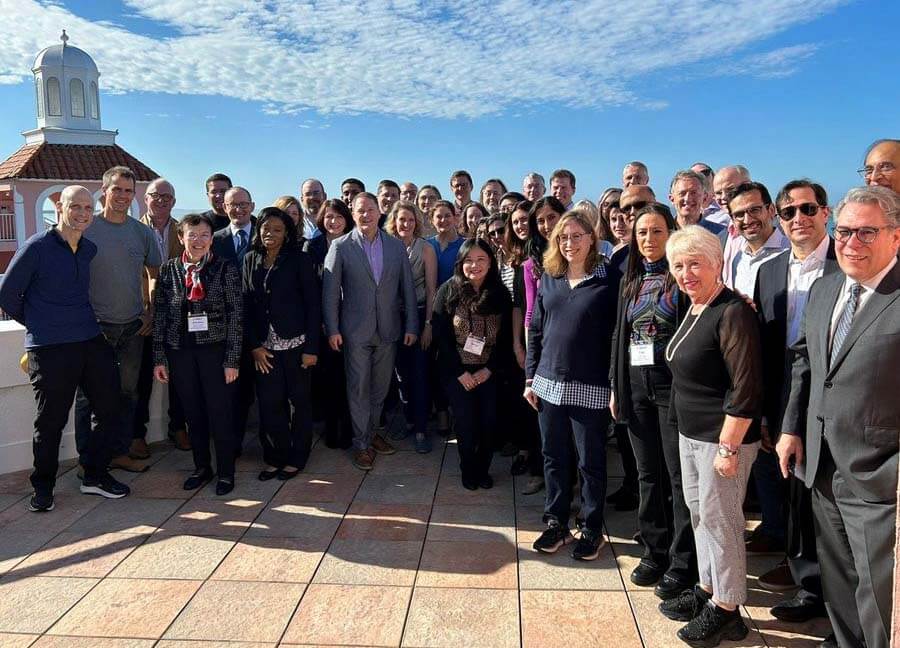
Earlier this year, one-third of the 55 participants at the ISHLT Leadership Retreat at The Don CeSar in St. Pete Beach, Florida, donated using SocialOffset. (Courtesy of ISHLT)
How IHSLT Partnered With SocialOffset
ISHLT CEO Greg Schultz, CAE, knew about SocialOffset due to his ties in the association community and recognized that it was solving a problem, he said. The abortion ban in Florida “was a professional/personal thing for our board, because in transplants, reproductive issues are an important component of the health care that is provided, and it’s important to have options for transplant patients,” he said. “For our U.S. members, it was generally a concern. I was very interested in having our group participate in SocialOffset.”
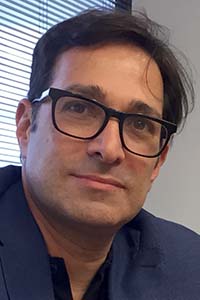
Greg Schultz
Schultz sent an email to all the ISHLT Leadership Retreat participants about the opportunity to donate using SocialOffset, making it “very, very clear that there were two things that I knew were going to be critically important, especially to our non-U.S. people: That this was completely optional, and that it would be anonymous,” he said. “I would not see who donated or how much. I was just going to get a dollar number, and number of participants.” This was important because of the global makeup of his members, he said, meaning “pay scales are not the same outside of the U.S. for people in health care, and there’s a great deal of sensitivity around that.”
Schultz worked with the SocialOffset team to select the charities that ISHLT board members could choose to donate to, which included Planned Parenthood Florida, Equality Florida, an advocacy group for LGBTQ Florida residents, and the Florida office of the Southern Poverty Law Center.
Of the 55 retreat participants, more than one-third made donations, which Schultz said was really significant, since half of the participants are not located in the U.S. SocialOffset recommended a donation level, calculated “based on the local taxes that you pay for lodging and ground transportation and food,” he said. “The idea is that they calculate what your average spend might be, and then what the tax on that would be based on the actual taxes in that location. In this case, we went down to the county level and they calculated the actual local taxes on everything. Then we came up with a suggested baseline donation that would offset the taxes based on our projected spend.”
Included in ISHLT’s post-meeting evaluation were a couple of questions about SocialOffset to see how it resonated with the group: Did you understand this? Did it add value? What would you do differently? “Over 90 percent of the people understood the concept,” Schultz said, “and 75 percent said that it added value to the meeting.”
Schultz thinks SocialOffset is “a great program that meets a need. As with anything, the details are in the communication and in the execution,” he said. “I share the general viewpoint that boycotts are not going to help — in fact, that they’re going to hurt the very people who we are trying to support, so this is a great alternative.”
Michelle Russell is editor in chief of Convene.
